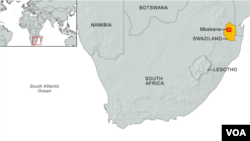Trade Union groups in Swaziland are considering nationwide demonstrations to pressure the administration in Mbabane to increase public sector workers’ pay.
The government released a salary review report which the unions say increases salaries of mostly senior officials in the public sector but see very little increase for “ordinary” workers.
Public sector workers in Swaziland have called for increased pay for the last 10 years. The government has often said the global economic downturn has made it difficult to meet those demands. King Mswati's government has called on Swazis to tighten their belts this year.
But, the unions are holding consultations with members to decide when to begin protests, according to Wandile Dludlu, national coordinator for a pro-democracy group known as the Swaziland United Democratic Front (SUDF).
“All the public sector workers unions have reacted in a very shocked way in the sense that they have not accepted most of the recommendations of the salaries review report because it seems to give more money to the upper section of the civil service, and very little to the ones that need it the most, which is the middle and the lower sections of the public service. [They] have been calling for the last 10 years... So that is what has basically caused shock waves in most of the public sector unions,” said Dludlu.
“So far, the reaction points to a possible mass rolling action in terms of protests to force government to concede [by] giving more salary increment to the middle and lower sections of the civil service, as most have been calling for.”
Dludlu says the government appears not to heed its own warning to tighten its belt because of the challenging economic conditions in the kingdom. This after the administration announced it has budgeted $6 million ($6,211,983) to buy a new jet for King Mswati. Members of parliament had urged the government to consider buying the king a new jet to replace the current DC-9.
Local media reported the government also aims to seek $9 million from the international community to help pay for drought relief after months of poor rain in parts of the country. Dludlu says Swazis are scared of the repercussions if they were to publicly challenge things that are meant for the king’s use, which he adds might not be beneficial to the citizens.
“[People] are silent on that, not because Swazis are not necessarily angry or shocked about the confused priorities in the sense that on one hand the country is plunging into a drought disaster, on the [other] hand the king has called in his speech on the throne that there must be tightening of belt by everybody. But government is seen loosening the belt on the spending on [the] king’s needs and wants,” said Dludlu.
“There has been quite an interesting reaction. On one hand public servants have been very angry openly against the prime minister in the issue of the salary review. But there have been quite silence on the other facts around on the reservation of money to be spent just on a jet for the king… that is not quiet shocking for some of us …because they are afraid to challenge the king openly.”
The government plans to buy new cars for use by visiting heads of state and government when Swaziland hosts the Southern African Development Community (SADC) meeting in August. Pro-democracy groups say the planned purchases, which they estimate at more than $11 million, reflect misplaced government priorities.
Supporters of the government insist the administration has an obligation to host the summit as a member of the regional bloc. But Dludlu argued that the administration cannot legitimately spend extravagantly on the summit while claiming it cannot afford to increase the pay of public sector workers.
“The reason why we are putting this demand is that on one hand they are saying the workers must tighten their belt, but they at the top are loosening their own belt, by spending more, buying new cars, a fleet of cars [to host] the SADC meeting. The expenditure of the monarchy is going up, but they are saying to the workers, we must tighten belt. It is on the basis of that is why we are not listening to them at all, because they seem not to walk their talk,” said Dludlu.
“The summit cannot be done at the expense of the abject poverty that continues to ground and grind Swazis.”
